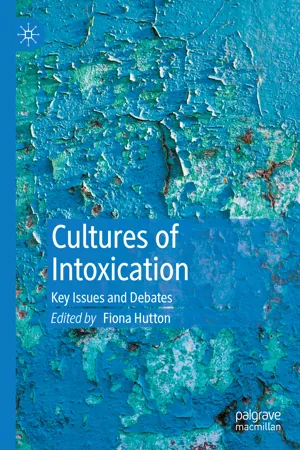The Importance of Intoxication
As is often noted by scholars writing about intoxication, historically, there is no recorded fully formed society that has existed without using psychoactive substances1—intoxication through a variety of means is a universal human theme (Walton, 2001, p. 2), and has a central role in diverse societies. In early societies intoxication and the use of psychoactive substances were seen as ways to commune with the gods through carefully constructed rituals, although later, intoxication came to be viewed as interfering with divine communion and was viewed instead as immoral, sinful and with disapproval (Walton, 2001). Intoxicants are often disapproved of when they are perceived as related to rebelliousness, disorder and immorality, and there have been strenuous attempts over the centuries to curtail the use of intoxicants, and the unfortunate, but pervasive punitive approach of prohibition (despite welcome challenges to this in recent years). These efforts, to curtail the use of psychoactive substances, have largely failed because the demand for intoxicants has endured over Millenia. Intoxication, therefore, is embedded in our social worlds, and even though intoxicants and their users may be disapproved of and legislated against, this does not mean that the demand for altered states of consciousness has ceased to exist. Intoxication is so embedded in human societies that Siegel (2005, p. 10) refers to it as the ‘fourth drive’, as much a feature of human existence, as other biological drives such as hunger, sex and thirst, and describes Homo sapiens as the ‘king (and queen?) of intoxication’ (Siegel, 2005, p. 10, emphasis added). Perhaps the attraction of intoxication is that it makes us feel different in comparison to our normal, everyday selves. Whether substances are used to soothe the pains of illness or trauma or simply to have fun and socialise, it is what intoxicants do and the effects they have that are often sought out by diverse groups across equally diverse societies: the enjoyment of experiencing an alternative feeling of self.
However, although intoxication is a feature of almost all societies globally, referred to by Herring, Regan, Weinberg, and Withington (2013, p. 1) as a modern obsession, people often have a troubled relationship with experiences of intoxication. Addictions to a variety of substances, both legal and illegal, cause harms to users, their families and communities, and dependent use can lead to problematic use of some substances by some users. These kinds of troubled intoxications are often what are represented in media and public discourse, representations often light on fact and heavy on fiction, giving a skewed notion of problematic relationships with intoxication (Alexandrescu, 2019; Ayres & Taylor, Chap. 11 this volume; Ayres & Jewkes, 2012). This leaves many struggling to see intoxication in anything but a negative light. The pleasures and benefits of intoxications are often seen as impermissible in this kind of climate and are side-lined in public and policy discourse around the use of psychoactive substances—almost as if there was something immoral in itself about referring to the pleasures of intoxication (Ettorre, 2015; O’Malley & Valverde, 2004). This aversion to pleasure is also puzzling, as the vast majority of global populations engage in intoxication, often on a daily basis, from minor intoxications via nicotine and caffeine, to more ‘spectacular’ intoxications via illegal drugs and alcohol.
Intoxication: Towards a Definition
‘Intoxication’, for the purposes of this edited collection, is viewed as a set of social and cultural practices, norms and values. Douglas (1987, p. 4) argued in relation to alcohol consumption that it is a highly patterned learned comportment which varies from one culture to another, so the debates presented here explore these settings and contexts in relation to diverse ‘intoxications’, and the ways in which individuals manage, maintain or change the experience of the self in the world (Bancroft, 2009, p. 5).
However, trying to define ‘intoxication’ is deceptively simple. A broad all-encompassing definition such as that used by Becker (1967, p. 164) viewing intoxication as ‘the aim of artificially inducing a change in one’s consciousness’ is useful as it covers intoxication by any means, both legal and illegal. Bancroft (2009, p. 15) similarly views intoxication as related to the ways in which individuals mange experiences in relation to their social worlds, affected by a variety of forces that shape human behaviour such as culture, habit and emotion. Although useful and important, what these kinds of definitions often struggle with are the complexities in defining what and what should not be counted as ‘intoxication’. For example, after drinking a cup of tea or coffee, the ‘user’ could be construed as ‘intoxicated’, but is this what intoxication is or how it should be defined? Perhaps instead a narrow definition could be used in which the intoxicated person is displaying visible signs of being intoxicated, such as excitement, slurred speech and so on. However, this type of definition also encounters problems as visible signs of intoxication occur often when a person has over consumed or is viewed as overly intoxicated such as staggering after drinking too much alcohol. Also, in terms of intoxication via substances like nicotine, as Keane in Chap. 3 notes, these micro-intoxications serve to provide excitement of sorts and breaks in routines from otherwise mundane working and leisure lives. This leads to the observation that intoxication itself is not necessarily visible, although it is often the visible signs of intoxication that are socially and culturally censored and disapproved of. Furthermore, some substances such as methamphetamine, heroin or crack cocaine, for example, can be viewed as symbolically or dangerously intoxicat...
